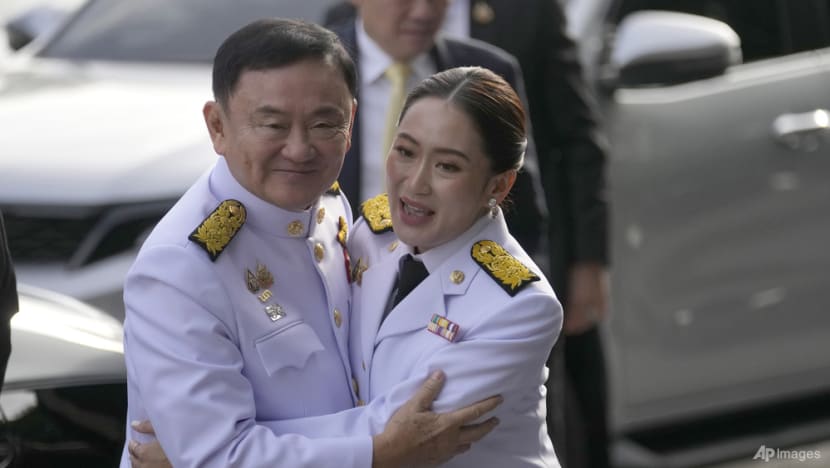Snap Insight: Even if Shinawatras survive Thai PM Paetongtarn’s fall, their grip on power is broken
The plight of Prime Minister Paetongtarn Shinawatra – who has been in power for just 10 months - underlines the reality that in Thailand, one must not antagonise the powerful army, says former foreign correspondent Nirmal Ghosh.


This audio is generated by an AI tool.
SINGAPORE: The suspension of Thai Prime Minister Paetongtarn Shinawatra on Tuesday (Jul 1) by the country’s powerful Constitutional Court in the short term deepens a new round of Byzantine political manoeuvring for power in Bangkok.
There are several scenarios possible in the weeks ahead, one of which is the dissolution of parliament and a return to the polls.
Deputy Prime Minister and Minister of Transport Suriya Jungrungreangkit of the Pheu Thai Party will serve as acting prime minister, but other aspirants are also waiting in the wings.
In the longer term, analysts say, it may be the end of the Shinawatra clan’s hold in Thai politics.
THAILAND’S POWERFUL ARMY
The proximate cause of the current crisis is the withdrawal last month of the Bhumjaithai Party from the ruling coalition, following the leak by former Cambodian leader Hun Sen of a phone call he had with Ms Paetongtarn over an ongoing border dispute. Mr Hun Sen is president of his country’s Senate while his son Hun Manet is prime minister.
The petition by 36 senators from Thailand’s upper house accused the 38-year-old Ms Paetongtarn, daughter of Thaksin Shinawatra and niece of Yingluck Shinawatra - both former prime ministers and both unseated in military coups in 2006 and 2014 respectively - of violating ethical standards in the leaked call.
The plight of Ms Paetongtarn – who has been in power for just 10 months - underlines the reality that in Thailand, one must not antagonise the powerful army.
In the call, Ms Paetongtarn called her much older Cambodian counterpart and friend of her father “uncle” - and also referred to a senior Thai army commander as an “opponent”.
Later, struggling to maintain her stature and her nationalist credentials, she apologised but also insisted that her remarks had been misunderstood and she only had the best interests of her country in mind.
There is some speculation of a potential coup d’etat. But while a coup d’etat is never quite off the menu for Thailand’s military - Thailand has been through 12 military coups since 1932 - it is generally seen as a last resort when the political situation is deemed untenable, for instance if there is widespread political violence.
DEMISE OF THE SHINAWATRA DYNASTY
Tuesday’s development may however signal the demise of the Shinawatra dynasty. Separately the same day, Thaksin, 75, appeared at a court in Bangkok to face accusations of breaching a lese majeste law that shields Thailand’s king from criticism. The trial could last for weeks.
The Shinawatra clan's influence has been eroding in recent years. Ms Paetongtarn has been unable to connect with the wider Thai public the way her father and aunt did, and their political party’s policy proposals have not resonated as they did in the past. Support for Ms Paetongtarn fell to 9.2 per cent in a recent poll, compared with 30.9 per cent in the first quarter.
The emergence of other reformist parties such as the Move Forward Party - which was dissolved in 2024 and later regrouped as the People's Party - signalled that the people have alternatives, said Titipol Phakdeewanich, a political science lecturer at Ubon Ratchathani University.
The Shinawatras were under the illusion they could still capture the people’s imagination, he said. “They cannot blame anyone but themselves” for this crisis, he told me.
“Even if the Shinawatra network somehow survives in name, its cohesion and political power will be far weaker from now on,” Pavin Chachavalpongpun, professor at Kyoto University’s Centre for Southeast Asian Studies said in an interview.
The episode also shows how cosy personal relationships between leaders - a characteristic of the 10-member ASEAN group which includes Thailand and Cambodia - can crash.
“The ASEAN way of ‘man-to-man’ relationships and informal negotiation failed spectacularly here, because those personal ties were weaponised,” Professor Pavin told me. “Over reliance on personal relationships rather than institutional frameworks leaves diplomacy dangerously vulnerable to leaks, manipulation and power plays.”
Nirmal Ghosh, a former foreign correspondent, is an author and independent writer based in Singapore.



















